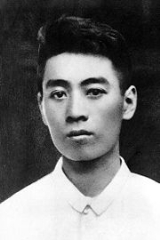
Zhou Enlai
Overview
Premier of the People's Republic of China
The Premier of the State Council of the People's Republic of China , sometimes also referred to as the "Prime Minister" informally, is the Leader of the State Council of the People's Republic of China , who is the head of government and holds the highest-ranking of the Civil service of the...
, serving from October 1949 until his death in January 1976. Zhou served under Mao Zedong
Mao Zedong
Mao Zedong, also transliterated as Mao Tse-tung , and commonly referred to as Chairman Mao , was a Chinese Communist revolutionary, guerrilla warfare strategist, Marxist political philosopher, and leader of the Chinese Revolution...
and was instrumental in consolidating the control of the Communist Party's
Communist Party of China
The Communist Party of China , also known as the Chinese Communist Party , is the founding and ruling political party of the People's Republic of China...
rise to power, forming foreign policy, and developing the Chinese economy
Economy of the People's Republic of China
The People's Republic of China ranks since 2010 as the world's second largest economy after the United States. It has been the world's fastest-growing major economy, with consistent growth rates of around 10% over the past 30 years. China is also the largest exporter and second largest importer of...
.
A skilled and able diplomat, Zhou served as the Chinese foreign minister
Foreign Minister of the People's Republic of China
The Foreign Minister of the People's Republic of China is the head of the Ministry of Foreign Affairs of the People's Republic of China and one of the country's most important cabinet posts...
from 1949 to 1958. Advocating peaceful coexistence
Peaceful coexistence
Peaceful coexistence was a theory developed and applied by the Soviet Union at various points during the Cold War in the context of its ostensibly Marxist–Leninist foreign policy and was adopted by Soviet-influenced "Communist states" that they could peacefully coexist with the capitalist bloc...
with the West after the stalemated Korean War
Korean War
The Korean War was a conventional war between South Korea, supported by the United Nations, and North Korea, supported by the People's Republic of China , with military material aid from the Soviet Union...
, he participated in the 1954 Geneva Conference
Geneva Conference (1954)
The Geneva Conference was a conference which took place in Geneva, Switzerland, whose purpose was to attempt to find a way to unify Korea and discuss the possibility of restoring peace in Indochina...
and helped orchestrate Richard Nixon's 1972 visit to China
1972 Nixon visit to China
U.S. President Richard Nixon's 1972 visit to the People's Republic of China was an important step in formally normalizing relations between the United States and the People's Republic of China. It marked the first time a U.S. president had visited the PRC, who at that time considered the U.S. one...
.
Quotations
All diplomacy is a continuation of war by other means.![]()
Saturday Evening Post (March 27, 1954)
China is an attractive piece of meat coveted by all … but very tough, and for years no one has been able to bite into it.![]()
To Chinese Communist Party Congress, New York Times (September 1, 1973)

